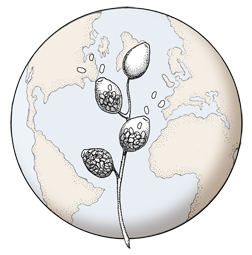Phytophthora spp. associated with Appalachian oak forests and waterways in Pennsylvania, with P. abietivora as a pathogen of five native woody plant species.
, , , and
Abstract
To document the distribution of potentially harmful Phytophthora spp. within Pennsylvania (PA), the PA Department of Agriculture collected 89 plant, 137 soil, and 48 water samples at 64 forested sites from 2018 to 2020. In total, 231 Phytophthora strains were isolated using baiting assays and identified based on morphological characteristics and sequences of nuclear and mitochondrial loci. Twenty-one Phytophthora spp. in nine clades and one unidentified species were present. Phytophthora abietivora, a recently described clade 7a species, was recovered from diseased tissue of 10 native broadleaved plants and twice from soil from 12 locations. Phytophthora abietivora is most likely endemic to PA based on pathogenicity tests on six native plant species, intraspecific genetic diversity, wide distribution, and recoveries from Abies Mill. and Tsuga Carrière plantations dating back to 1989. Cardinal temperatures and morphological traits are provided for this species. Other taxa, in decreasing order of frequency, include P. chlamydospora, P. plurivora, P. pini, P. cinnamomi, P. xcambivora, P. irrigata, P. gonapodyides, P. cactorum, P. pseudosyringae, P. hydropathica, P. stricta, P. xstagnum, P. caryae, P. intercalaris, Phytophthora ‘bitahaiensis’, P. heveae, P. citrophthora, P. macilentosa, P. cryptogea, and P. riparia. Twelve species were associated with diseased plant tissues. This survey documented 53 new plant-Phytophthora associations and expanded the known distribution of some species.


